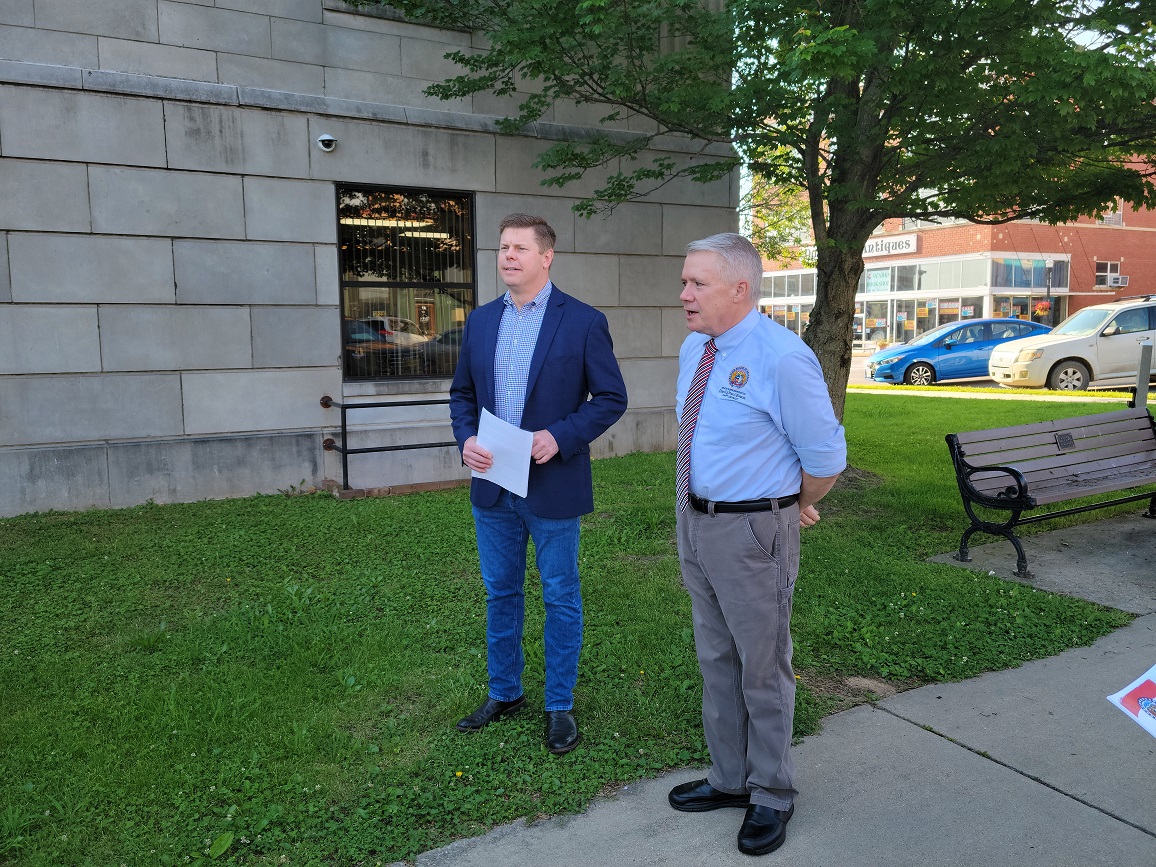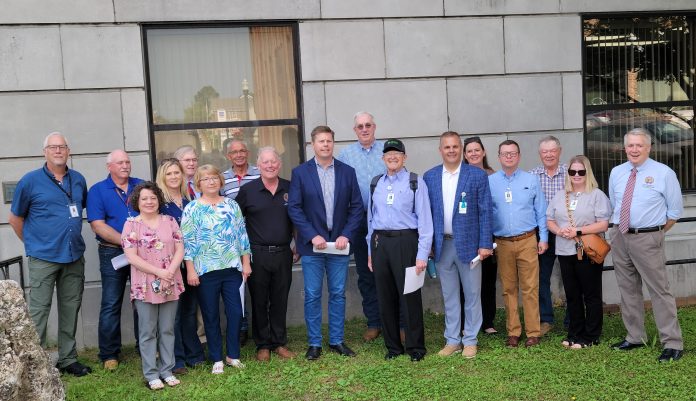Legislative leaders just completed an 18-stop “end of session” tour recapping the legislative highlights from the 2024 session. The tour started in West Plains, Missouri on Monday, May 20, and ended in St. Charles, Missouri on Tuesday, May 28.
“Our goal was to discuss issues and answer questions from citizens, community leaders, and members of the local media,” House Speaker Dean Plocher, R-Des Peres, said. “Most discussion and questions were focused on our balanced budget, stopping illegal immigration, reforming and strengthening public education, fighting crime, slowing property tax increases, and ensuring the integrity of our elections. We had some dynamic conversations and I want to thank all my fellow Representatives who joined me in these meetings.”
Balanced Budget
Budget Chair Cody Smith, R-Carthage, joined Speaker Plocher in Joplin and explained how he was able to reduce spending in Missouri for the first time since 2012.
“Crafting a budget that is fiscal sustainable was our primary goal,” Smith said. “This year’s budget balances our ongoing expenditures with the revenue estimates, while saving one-time money for future known expenses. I’m proud of the fiscally conservative and balanced budget we have achieved by avoiding wasteful expenditures and focusing on infrastructure, and this product will leave Missouri in a good position for years to come.”
During most all the stops, questions and comments surrounding the FY 2025 budget were all supportive of the balanced budget achieved by Chairman Smith. Longtime Capitol observers and members of the media were amazed that spending went down $1.2 billion from FY2024 and even more shocked that the politicians had saved $1.5 billion in reserve. Eddy Justice from Butler County added, “Most of the time if the government has extra tax dollars laying around, they spend it! I was pleasantly surprised they decided to save some for a rainy day.”
Stopping Illegal Immigration
With an estimated 10.2 million illegal immigrants crossing our border since 2020, immigration questions dominated the discussion at most of the stops. Chief Whip Hardy Billington, R-Poplar Bluff, who joined Speaker Plocher in Poplar Bluff, introduced several border security bills this session and Representative Ben Baker, R-Neosho, handled the House Joint Resolution that will allow voters to decide if “only” U.S. citizens should vote in Missouri elections.
The legislature also cut off funding to any Missouri municipality trying to become a sanctuary city and they included almost $8 million in the budget for Operation Lone Star to send our troopers and guardsmen to defend the southern border in Texas. Governor Parson has reported our servicemen have assisted in the detention of over 4,000 illegal immigrants and five of them were on the terrorist watch list.
“Last year I visited the border and talked with border agents, ranchers and the Texas Border Czar Michael Bank about the illegal immigration crisis,” Representative Jim Murphy, R-St. Louis, said. “It is clear we need to detain and deport any illegals found in Missouri and we should require employers to verify the immigration status of their employees.”
Property Tax Reform
In January, Speaker Plocher formed a special committee to reform property taxes in Missouri. With many citizens seeing 100 percent, 200 percent, and even 300 percent increases to their property tax bills, he felt something had to be done. Representative Brad Christ, R-St. Louis, was named chair and the new committee looked at some innovative ways to keep property taxes in check and allow citizens to remain in their homes.
“Our top accomplishment was clearing up the uncertainty surrounding the senior citizen property tax freeze we passed last year,” Christ said.
While that is going to really help those over 62, reforms are still needed to address the property valuation and assessment process. Representatives Mike McGirl, R-Potosi, Roger Reedy, R-Windsor, Mark Matthiesen, R-O’Fallon, Darin Chappell, R-Rogersville, and Jeff Coleman, R-Grain Valley, all sponsored innovative legislation that would cap the growth in assessments without negatively impacting local taxing districts.
Wendy Hausman, R-St. Peters, reported to Channel 4 and Spectrum news at the St. Charles event that, “Unfortunately, some great bills to reform property taxes in Missouri were a victim of Senate infighting. They received strong bipartisan support in the House but never received a floor vote in the Senate.”
Transforming Education
“2024 will probably be remembered as the biggest positive change to education in Missouri since the new foundation formula was passed in 2005,” Speaker Plocher remarked. “By passing SB727, parents will have more choices in their child’s education and public-school funding will be protected, all while improving the recruitment and retention of our front line teaches by increasing minimum teacher pay to $40,000!”
Over the past several years, substantive education reform bills have been introduced and promptly failed because public school advocates and school choice reformers were not aligned. With 31 sitting legislators seeking higher office in 2024, most observers forecasted that real education reform was not possible this session. However, because of the leadership of Speaker Plocher and Republican majority, these factions were brought together, and an education reform bill was passed with 19 votes in the Senate and 82 in the House.
Bill handler Phil Christofanelli, R-St. Charles, exclaimed, “SB727 will grant more families’ access to Missouri Empowerment Scholarships and give Boone County residents a charter school option. I think this bill passed because it tied scholarships and public-school funding together for the first time.”
While it was a close vote, Education Chair Brad Pollitt, R-Sedalia, had this to say about what SB727 would mean to the future of education in Missouri:
“As a 34-year educator and former superintendent I believe there are a number of items in the bill that balance traditional and prochoice individuals. I’m pleased this bill will help our traditional public schools financially and at the same time offer some additional choices to parents. Prioritizing the Missouri Empowerment Scholarships to kids with special educational services will be a huge help to families and schools. Also, refining the daily attendance calculations and helping fund higher salaries for our front-line teachers will positively impact all children in our schools.”
Rep. Josh Hurlbert, R-Smithville, who homeschools his children, said he believed the education bill was the biggest win of the session. “This was a carefully negotiated package that was a win for public schools, a win for school choice, and a win for homeschoolers,” concluded Hurlbert. “We raised minimum teacher salaries from $25,000 to $40,000 and put $500 million more into the public education funding formula, while also expanding the MOScholars K-12 Scholarship program statewide and increased protections for homeschoolers.”
Fighting Crime
With last year’s omnibus crime bill getting vetoed by the governor, passing a bill that would stop the flood of fentanyl into our communities was a top priority of most members of the legislature. Crime Prevention & Public Safety Chair and SB754 bill handler Lane Roberts, R-Joplin, joined Speaker Plocher in Joplin to talk with KZRG radio and local citizens about what was included in this year’s omnibus crime bill. “While SB754 was a comprehensive crime fighting package there were three provisions I want to highlight. “Blair’s Law” that bans celebratory gunfire, “Valentine’s Law” that prohibits fleeing from a motor vehicle stop, and “Max’s Law” that protects law enforcement animal assaults.”
This legislation also sets up a cybercrime task force that will make recommendations on what tools are needed to stop cyberstalking and harassment and it increases penalties for drug dealing and trafficking of controlled substances. Representative David Casteel, R-High Ridge, added, “Putting fentanyl pushers behind bars is so important for the safety of our communities. Giving this drug to our kids should be treated like murder. Supporting police officers and prosecutors who will go after these drug dealers was one of our top priorities this year.”
Representative Bill Allen, R-Kansas City, who is wrapping up his first term in the Missouri House, talked with KPGZ News in Liberty and stressed he was proud to have his legislation stiffening penalties for fentanyl dealers make it to the Governor’s desk as part of SB 754. “Fentanyl is a crisis. 1,500 Missourians die from fentanyl and other synthetic opioids each year,” Allen said. “This measure increases penalties on those mixing fentanyl with other drugs, making it a felony with three to ten years of jail time for causing serious injury and up to life in prison if it results in death.” According to the most recent data from the Missouri Department of Health and Senior Services, 62 Clay Countians died from drug overdoses in 2022. Increasing penalties on narcotics traffickers will keep drug dealers off our streets.
Supporting Small Business
Small Business Committee Chairman Chris Brown (R-16) was on hand at the liberty stop and remarked, “Despite the low number of bills passed it was a very good year for protecting small businesses. The most important bill we passed for the Kansas City region was SB1388 that will expand the Kansas City National Security Campus and create 2,000-3,000 high paying federal jobs.”
Another bill Representative Chris Brown, R-Kansas City, has championed an eviction moratorium bill for the last three years since the COVID-19 shutdowns. Representative Phil Amato, R-Arnold, was able to pass his “anti-squatter” language to the evictions moratorium bill, which protects property rights for homeowners across Missouri. “I’ve supported Rep. Brown’s bill since I got into office, and adding my language allowing homeowners to remove trespassers from their property delivered a huge win for property rights this year,” Amato said.
Representative Alex Riley, R-Springfield, succeeded in passing the Regulatory Sandbox Act. The Regulatory Sandbox Act grants temporary regulatory exemptions to innovators and small businesses so that will remove entry barriers and allow them to expand and create more job opportunities. Representative Riley emphasized the significance of offering an alternative mechanism for those grappling with regulatory obstacles, noting “Missouri has been burdened by over 113,000 regulations at the state level, in addition to federal and municipal regulations. The Regulatory Sandbox Act is our response to this substantial burden, offering a lifeline to innovators and entrepreneurs striving to introduce new services, products, and technologies to the market.”
Another boost to small businesses occurred in the passage of HB1803, which expands the MOBUCK$ program. The MOBUCK$ program enables participating lenders to reduce interest rates by 2-3 percent, providing significant benefits to eligible borrowers. Unfortunately, the MOBUCK$ program faced a temporary halt in new applications in May due to overwhelming demand. The legislation, which passed out of the House with a vote of 138-10 and the Senate with a unanimous 33-0 vote, puts in place a substantial $400 million augmentation to the MOBUCK$ program, addressing the surging demand for the initiative and the pressing need to counteract inflationary pressures.
“The MOBUCK$ program stands as a tried-and-true initiative aiding our farmers and small businesses in trimming their expenses by easing loan interest burdens,” Representative Terry Thompson, R-Lexington, said. “In the face of ever-escalating costs across the country, it’s important that we continue to offer our citizens relief and ensure that their hard-earned dollars yield optimal returns in today’s economy. When Missouri funds work for Missourians, we all benefit.”
Protecting Life
One of the top priorities in both the Senate and House was prohibiting abortion providers from receiving state funds. While abortion has been eliminated in Missouri, concerns arose from reports of Planned Parenthood’s efforts to traffic women and minors across state lines to perform abortions. Chairman Cody Smith passed HB 2634 to end funding for Planned Parenthood and increased funding for Pregnancy Resource Centers. Charlotte Boyer, who attended the Farmington event and learned about the efforts to protect life, said, “This is very encouraging news. I didn’t know we had zero abortions in Missouri, but I’m thankful they sent money to help the Pregnancy Centers.”
Investing in Infrastructure
One item that came up at almost every stop were infrastructure projects. The FY 2025 budget included millions of dollars to improve Missouri roadways. When speaking to the Hannibal Courier-Post in Marion County, Representative Louis Riggs, R-Hannibal, said, “In our area, $2.5 million is going towards an engineering study to upgrade U.S. 36 to Interstate 72, and $2 million will be spent for constructing the Hannibal Expressway with $100 million more for rural and low volume roads across the state.” He continued, “Those of us who are the closest to Canada have more problems with the roads because of the freezing and thawing. We also have farm equipment that’s not getting any smaller anytime soon going across load limit bridges and school buses taking chances on weight restrictive bridges.”
Northeast Missouri legislators were not the only ones lauding Governor Parson’s efforts to invest in infrastructure. In the opposite corner of the state, Reps. Cody Smith, Melanie Stinnett, R-Springfield, Bill Owen, R-Springfield, Tara Peters, R-Rolla, and Don Mayhew, R-Crocker, expressed their thanks that $727.5 million to expand Interstate 44 to six lanes.
Representatives Hardy Billington, Donnie Brown, R-New Madrid, Jamie Burger, R-Benton, John Voss, R-Cape Girardeau and Senator Jason Bean conveyed their excitement at the Poplar Bluff and Cape Girardeau stops about the $60 million added for Highway 67 improvements in Southeast Missouri.
Of course, the Kansas City and St. Joseph area representatives all fought hard to get $53 million put in the budget for improvements to Interstate 29 and Interstate 35. Their enthusiasm can best be summed up by Rep. Dane Diehl’s comment, R-Butler, “Investing in the arteries of commerce that are so vital to our region is one of the best ways we can grow our economy and improve the future for our children.”
Broadband access received a $1.5 billion boost in this year’s budget. At the Hannibal stop, Representative Riggs stated, “We have approximately a million Missourians who still don’t have good internet access. We’ve been working on improving access since 2019 and it’s a major achievement to see $1.5 billion going toward expanding broadband access across our state!”
Additionally, over $25 million in funding was approved for 16 port projects that will take advantage of our natural inland waterways and expand commerce and manufacturing throughout Missouri.
Honoring Our Veterans
Another important topic discussed at many of the stops was supporting veterans and first responders. The budget includes increases of $2.5 million for veteran housing assistance and $4.25 million in the budget for PTSD treatment for first responders. Representative Doyle Justice, R-Troy, said, “I was honored to have co-sponsor some of the bills that will help prevent veteran suicide, provide educational assistance and cut taxes on enlistment bonuses.”
Additionally, Veterans Chairman Dave Griffith, R-Jefferson City, sponsored HB 1495 that directs the Missouri Veterans Commission, in collaboration with the Department of Mental Health, to implement measures to curb veteran suicide. A U.S. Department of Veterans Affairs report revealed that 6,392 veterans nationwide lost their lives to suicide in 2021, marking an increase of more than 100 lives from the previous year. In Missouri, 185 military veterans die by suicide that year. “Our rate of veteran suicides is 45.2 per 100,000, but the national average is just 33.9. Missouri’s statistics are significantly higher than the national average,” Griffith said.
Promoting Agriculture
Several agricultural bills received a warm welcome from the rural stops on the tour. A Department of Natural Resources rule change left a loophole in the regulations that allowed some confined feeding operations to dispose of their waste products by spreading them in open fields. The need for this legislation originated from complaints in southwest and central Missouri, where residents expressed concerns about the odor and environmental hazards associated with the storage and spreading of waste material from meat processing and various other food related industries.
“This legislation addresses a critical need to regulate the land application of industrial wastewater, sludge, and related process wastes. It is essential for ensuring the preservation of our rural farmland, safeguarding against the environmental impact of meatpacking waste, and fostering a sustainable balance between conservation, agriculture, and the meat processing industry,” Representative Ed Lewis, R-Moberly, remarked.
Another bill designed to help make credit more available for small businesses in rural areas set up the “Missouri Rural Access to Capital Act”. This legislation authorizes a rural tax credit that could grant access to around $106 million for farmers and entrepreneurs in rural Missouri. Rep. Kurtis Gregory, R-Marshall, sponsored the bill and he stated, “All too often folks in rural areas are not able to obtain the credit they need to start or expand their business operation. This tax credit will help fill the credit void in these areas. I’m excited for the future of Missouri agriculture and what farmers, ranchers and rural small business owners will be able to accomplish with this program.”
Legislation That Did Not Pass
Of course, at each stop questions were asked about some of the priorities that did not make it across the finish line this year. Initiative petition reform received the most questions, with health insurance for Farm Bureau members and childcare tax credits were also topics that Missourians wanted to discuss.
“Most of the priority bills that did not pass were victims of the Senate infighting. We were able to pass them out of the House, but they never received a floor vote in the Senate,” said Chief Whip Hardy Billington. Two other priorities that did not become law were Representative Roger Reedy’s personal property tax reform bill that would help keep motor vehicle assessments from growing out of control and Representative Dane Diehl’s pesticide labeling bill that promoted the use of pesticides registered with the Environmental Protection Agency.
There was another group of bills that also did not garner support from House members. HJR105 would have established the “Right to Abortion Care” which stipulated that anyone could obtain an abortion with no restrictions right up until birth. HB1687 would have required all energy in Missouri to come from renewable sources by 2059. HB1462 would have repealed the Right to Carry in Missouri.
Assistant Floor Leader Burger added, “Some of the more extreme legislation introduced this year just didn’t have the votes to make it through the process. A small minority of members are in favor of allowing partial birth abortion and repealing the ‘Right to Carry’ would fall far short of 82 votes in the House and 18 in the Senate. Almost everyone was concerned about switching to all renewable energy sources by 2059 because of the dramatically higher utility bills citizens would have to pay.”
With the election year political headwinds blowing in from having 31 sitting legislators running for higher office, many political experts were surprised at how many major pieces of legislation were passed.
“At the beginning of session, political prognosticators predicted a special session would be required to pass the FRA and get a budget done. However, we passed a balanced budget that cut spending by $1.2 billion from last year and saved a $1.5 billion surplus for a rainy day,” Speaker Plocher said. “We also got the FRA done, passed an education bill that increased teacher salaries, protected school funding, and expanded school choice for parents. Additionally, we defunded Planned Parenthood, prohibited illegal aliens from voting, and banned sanctuary cities in Missouri.”
He summed the session up by saying, “Overall, this session was about quality not quantity.”







